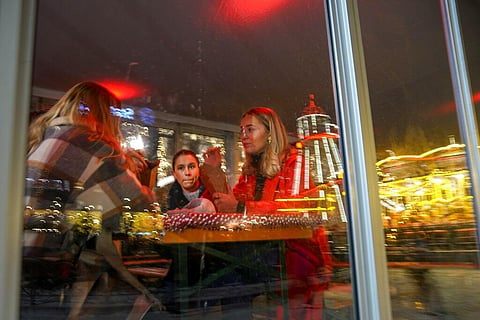

COPENHAGEN: The Norwegian government is introducing a 10-person limit for gatherings at private homes to counter an uptick in COVID-19 cases, although the number will be increased to 20 on Christmas and New Year's eves.
It also is capping attendance at public events without assigned seating at 50.
In addition, the government said late Tuesday it was advising people in Norway to work from home when possible and reintroducing a social distancing requirement calling for 1 meter (3.3. feet) between restaurant customers.
Face masks will be mandatory where the distance requirement cannot be met.
The measures take effect at 12:01 a.m.
Thursday and are set to last for four weeks, the government in Oslo said.
"We consider the situation as being serious. Both delta and omicron infections are increasing in Norway. The number of people who are admitted to hospitals and intensive care units is increasing," Prime Minister Jonas Gahr Stoere said.
Camilla Stoltenberg, the head of the Norwegian Institute of Public Health, said during a news conference with the prime minister that among the infection trends the government monitors, "much points in the wrong direction."
"Unfortunately, the coronavirus will also cause a lot of infection and serious illness this winter, perhaps more than ever before in this pandemic in Norway," Stoltenberg said.
"We have already seen this with the delta variant, and it will probably get worse with the omicron variant," she said.
The Nobel Peace Prize award ceremony scheduled to take place Friday at Oslo City Hall will be scaled down, with fewer guests and participants required to wear face masks, the Norwegian Nobel Committee said.
The winners of the 2021 peace prize, journalists Maria Ressa of the Philippines and Dmitry Muratov of Russia, plan to attend the ceremony.
The two shared the prize for fighting for freedom of expression in countries where reporters have faced persistent attacks, harassment and even targeted killings.
A Thursday press conference featuring the pair will take place online "due to COVID restrictions," the Norwegian Nobel Committee said Wednesday.
In neighboring Sweden, authorities recommended that employers give their workers the opportunity to work from home.
Starting Wednesday, face masks were required on public transportation when crowding can't be avoided, Swedish authorities said.
Health Minister Lena Hallengren told Swedish broadcaster SVT the government was prepared to order more public health measures at short notice.
"So far, Sweden has a low spread of infection, but we do not want a more difficult situation," Hallengren said.
Austria's fourth national lockdown of the pandemic will end on Sunday but lockdown restrictions will remain for unvaccinated people, the country's new chancellor said Wednesday.
Chancellor Karl Nehammer said the end of the lockdown will be a "opening with a seatbelt," meaning some measures, such as an obligation to wear masks on public transportation and inside stores and public spaces, will stay in place also for people who are vaccinated or have recovered from COVID-19.
There will also be an 11 pm curfew for restaurants and limits on the number of people attending cultural events.
Stricter measures can be implemented independently by regions that are especially affected by the pandemic, Nehammer said.
Nehammer stressed that unvaccinated people could end their lockdowns immediately by getting the jab, but also acknowledged that "it still takes a lot of convincing to get those who haven't even been vaccinated yet."
"The lockdown for the unvaccinated continues. I also understand that the people who are affected by it feel aggrieved," Nehammer told reporters in Vienna.
"At the same time, there is the offer of science, that by getting vaccinated these troubles can be quickly put aside and that then common freedom can actually be lived together."
Austria has a relatively low vaccination rate for Western Europe, with just 67.7% of the population fully vaccinated.
Tens of thousands have protested across the Alpine nation in recent weeks against the lockdown and the upcoming vaccine mandate.
The government announced last month that it would implement a vaccine mandate early next year and said Wednesday that details about the compulsory vaccinations will be presented later this week.
Under the lockdown, which started on Nov.22, people were allowed to leave their homes only for specific reasons, including buying groceries, going to the doctor or exercising.
Day care centers and schools remained open for those who need them, but parents were asked to keep children at home if possible.
The country's seven-day infection rate declined by about half during the lockdown.
It stood at 535.6 cases per 100,000 residents on Tuesday, down from more than 1,100 on the day the lockdown started.
Nehammer was sworn in Monday as Austria's third chancellor in two months, capping a round of upheaval triggered by the decision last week of Sebastian Kurz, the country's dominant political figure of recent years, to bow out of politics.
Nehammer, 49, has been Austria's interior minister since early 2020.
He also is taking over as leader of the conservative Austrian People's Party, which Kurz led to election victories in 2017 and 2019.